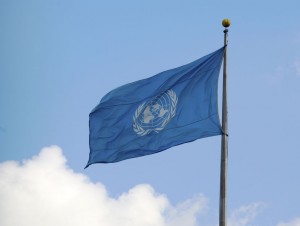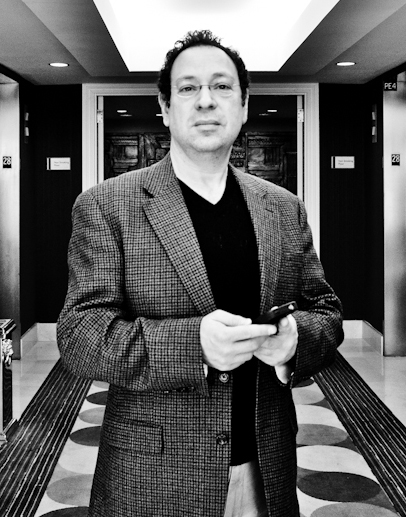Meet the Volunteer: David Orenstein

The American Humanist Association recently appointed Dr. David I. Orenstein as the organization’s representative to the United Nations in New York. The American Humanist Association maintains non-governmental (NGO) status and has a long history of UN involvement on issues related to freedom of belief, education, women’s rights, LGBT rights, and the environment. Learn more about Dr. Orenstein below!
TheHumanist.com: What is your educational and work background?
Dr. David Orenstein: I like to think of my career and education as focused on changing lives. I am an educator and mentor. I grew up poor in a housing project in Brooklyn, New York. Education was a way out and up from poverty. I earned a bachelor’s degree in anthropology, two graduate degrees, one in information studies and the other in non-profit management. I also hold a PhD in education. So I’ve been able to combine my educational pursuits with teaching. I generally teach anthropology to undergraduates, but I’ve also taught graduate school. I’ve worked in many non-profit and higher education institutions in my 25-year career in New York, New Jersey, and Maryland. Now, as Department Chairperson and Chief Librarian at CUNY’s Medgar Evers College, my career and my secular humanist interests have come full circle.
TheHumanist.com: When did you first learn about humanism?
 Dr. Orenstein: That’s a great question. I think I’ve always been a secular humanist even without knowing the modern definition. I think we’re all pretty much born secular humanists and that it’s culture, with its many devices and desires that break us apart into tribes and religions and all these other unreal things, like races for instance. There is only one race—the human race. But while I began my journey into atheism at about eight years old, my beliefs about humanity came later and were developed over my lifetime of reading authors like David Hume, Bertrand Russell, Charles Darwin, Robert Ingersoll, and modern authors like Victor Stenger, Steven Pinker, and of course, the Four Horsemen. Lately, I’ve been really interested in the formation of empathy and Paul Bloom’s work on how babies show empathy as early as three months old, without religion to tell them to be good. This indeed shows that we’re genetically wired to be good without god.
Dr. Orenstein: That’s a great question. I think I’ve always been a secular humanist even without knowing the modern definition. I think we’re all pretty much born secular humanists and that it’s culture, with its many devices and desires that break us apart into tribes and religions and all these other unreal things, like races for instance. There is only one race—the human race. But while I began my journey into atheism at about eight years old, my beliefs about humanity came later and were developed over my lifetime of reading authors like David Hume, Bertrand Russell, Charles Darwin, Robert Ingersoll, and modern authors like Victor Stenger, Steven Pinker, and of course, the Four Horsemen. Lately, I’ve been really interested in the formation of empathy and Paul Bloom’s work on how babies show empathy as early as three months old, without religion to tell them to be good. This indeed shows that we’re genetically wired to be good without god.
TheHumanist.com: What interests you most in volunteering for American Humanist Association as its United Nations representative?
Dr. Orenstein: Well, first I have to thank Roy Speckhardt, Maggie Ardiente, and my dear friend John Wagner for supporting my UN participation and service to the American Humanist Association. I truly believe that one person can change the world. We can all, as Dr. Martin Luther King, Jr. said, “be the change.”
My UN volunteering is my giving back on a global level in a way I already do at the local level through my advocacy work with several NYC freethought organizations. My focus is certainly on human and civil rights, and the secular civil rights movement is now a global phenomenon. I want to work to ensure people regardless of place are allowed to speak, write, and gather freely and without the threat of violence. I also want to work to protect the rights of women and children who so often are negatively impacted by religious, ethnic and sectarian violence.
TheHumanist.com: What activities will you be participating in at the United Nations?
Dr. Orenstein: I feel like I’m at an all-you-can-eat buffet with my UN grounds pass. I’d like to participate in many things, including giving testimony in Geneva to the UN’s Human Rights Commission, but I am going to focus on three main areas to start. I will be following and attending meetings of: (1) the Special Rapporteur on Freedom of Religion and Belief, (2) the Committee on the Rights of the Child (CRC), and (3) the UN Human Rights Council. We have to remember that the freedoms of thought, movement, and action aren’t just American issues, they’re universal issues, and that is what I hope to protect during my tenure.
There are also countless other meetings and programs in which NGO reps can participate which I’ve been looking into. Additionally, I’ve been speaking to diplomats and international secular humanist activists to gauge trends.
Finally, I don’t stand on my own here; I am speaking on behalf of the American Humanist Association’s UN goals and objectives.
TheHumanist.com: Did you grow up in a particular religious tradition? What was that experience like for you?
Dr. Orenstein: I grew up in a Brooklyn household in a very secular Jewish family. My parents were believers, but they never pushed their beliefs onto me. So being “Jewish” for me has always been a cultural New York City thing, sort of comparable to Woody Allen and Carl Sagan’s experiences. I had a bar mitzvah at thirteen, but that was really the only time I went to temple. I was so bad at reading Hebrew that the rabbi had to write out my prayers phonetically.
Of course, today I’m much more sophisticated and have actually read most of the Hebrew Bible, the New Testament, and the Qur’an amongst other religious works— I had to because I also teach comparative religion as an anthropology professor. In my assessment, religion does provide some comfort to those who need to believe in supernatural forces, but on the whole, theology and dogma are arcane ways of knowing and are out of touch with today’s reality. Where religion does thrive, violence and human rights violations aren’t far behind. So what I knew as a child (though not how to articulate), I still accept today: we must be kind to others, and we can learn to grow emotionally to heal the world secularly.
TheHumanist.com: Have you read any good books lately? What is your favorite book?
Dr. Orenstein: I just finished Jerry Coyne’s new book Faith vs. Fact: Why Science and Religion are Incompatible and I am currently reading Phil Zuckerman’s Living the Secular Life: New Answers to Old Questions.
I also very much liked the book Does Santa Exist?: A Philosophical Investigation by Eric Kaplan (a co-executive producer of The Big Bang Theory). It’s a tongue-in-cheek philosophical argument about the possibility of Santa. Of course, you can replace “Santa” with the word “God” and have the same argument.
If I had to choose one book though, it would be Carl Sagan’s The Demon-Haunted World: Science as a Candle in the Dark. I’ve read the book multiple times, and I still get goose bumps. Sagan is my favorite writer, next to the late Christopher Hitchens—what a loss they both are to the movement.
TheHumanist.com: If you could have dinner with any three people (living or dead), who would they be and why?
Dr. Orenstein: My first choice would be my late father, Murray Orenstein, who passed away of lung cancer in 1989 when I was in my late twenties. He saw me grow up but not into the man I’ve become today. He’d be proud of me. I love him and miss his great mind dearly. He never went to college because of the Great Depression, but he insisted I go, and he made sure I did.
The second person is Carl Sagan. Watching Cosmos in the 1980s was as close to an actual religious experience as I think I’ll ever have. I’d want to thank him for helping me on my road to reason, humanism, freethought, and unbiased inquiry.
Lastly, I would choose Ricky Gervais. Clearly, he’s a great advocate for atheism and secular humanism, but he’s a hell of a funny guy too. I’d love to go to a local pub and down a few pints of beer with him.
If you ask me this question again, I may (or may not) have three totally different people in mind. For today, that’s my perfect three.
